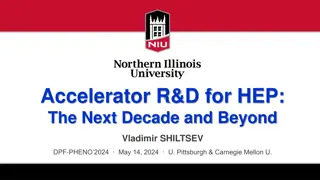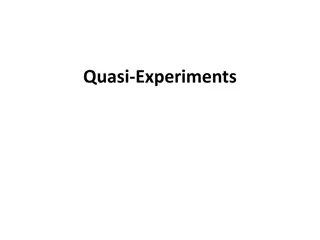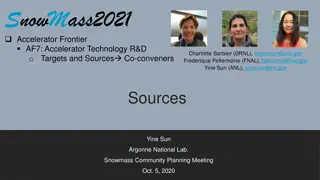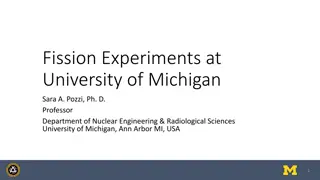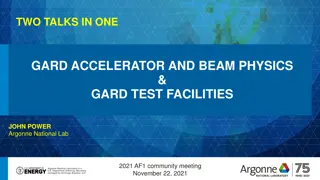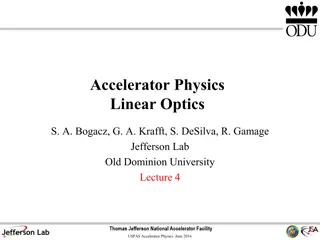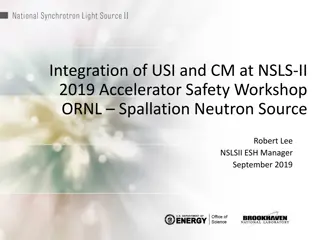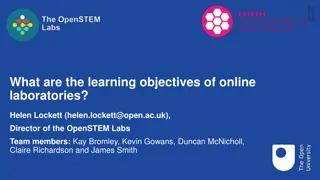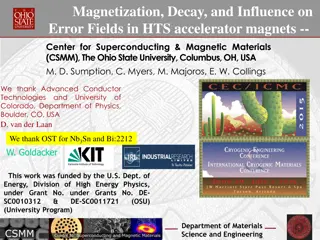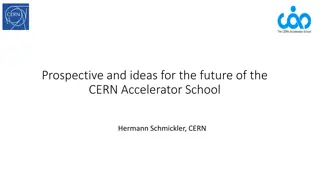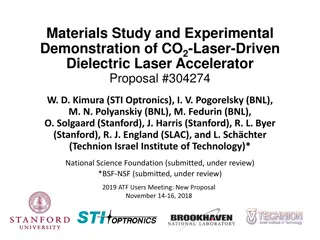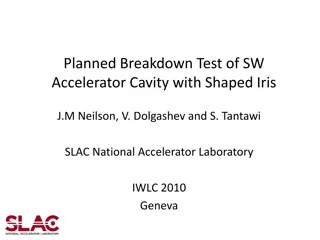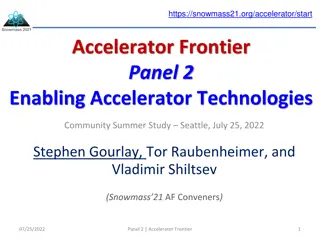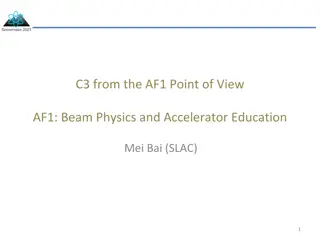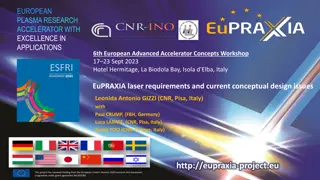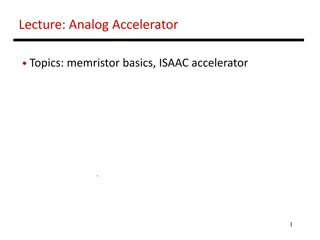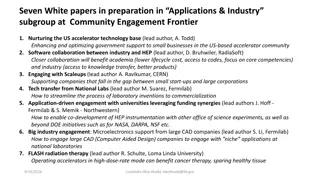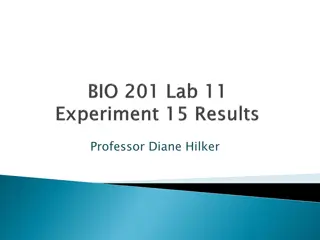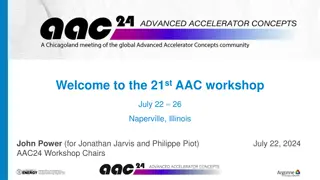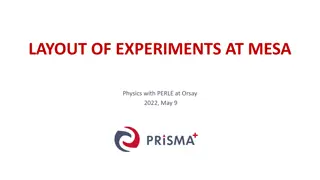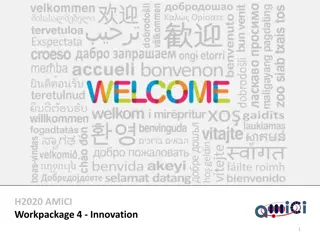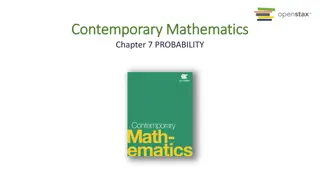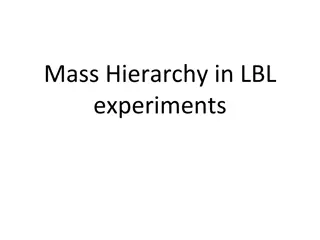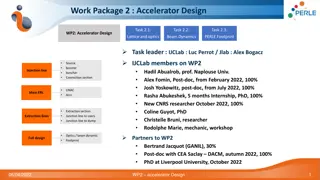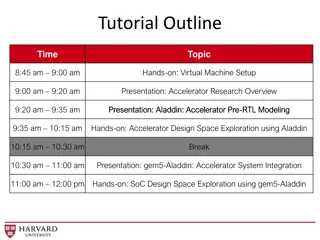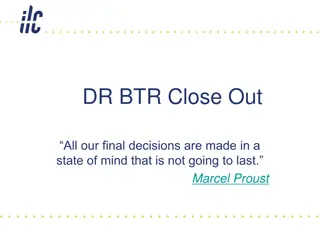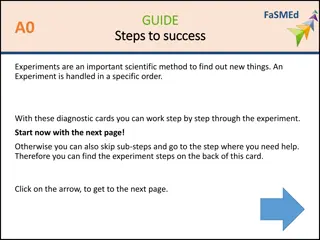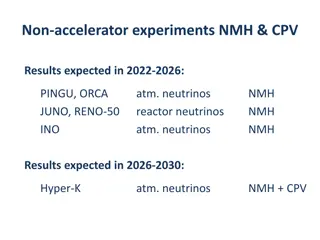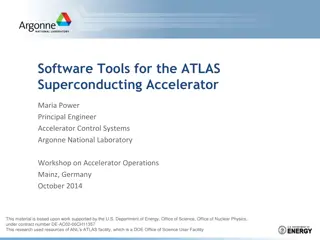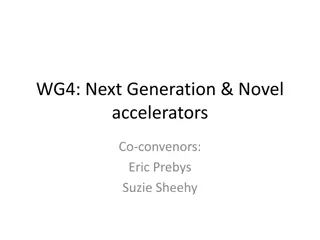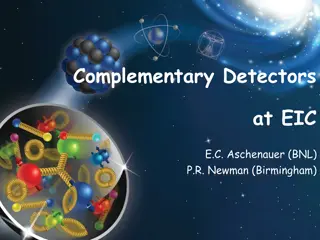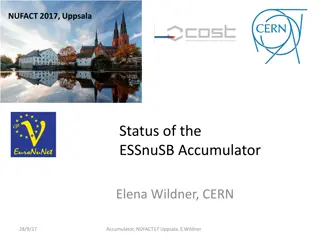The SDG Accelerator Fund
The SDG Accelerator Fund aims to establish a replicable financial facility that links key actors and utilizes blockchain technology to support SMEs in achieving the Sustainable Development Goals. With investments between $100,000 to $2.5 million per venture, the fund promotes cost-effectiveness, tra
1 views • 9 slides
Current Trends in High Energy Accelerator Developments
Explore the latest trends in high energy accelerator development as discussed by experts from various institutes around the world, including proposals from China and existing accelerator projects. Learn about the classification of accelerator facilities based on size and the ongoing evolution of fut
0 views • 36 slides
European Particle Physics Strategy Update & Accelerator R&D Overview
European Particle Physics Strategy updates serve as the cornerstone for long-term decision-making in the field, with a focus on Accelerator R&D for High Energy Physics. The update process involves key questions, R&D strategies for RF technologies, and implementation plans. Approved strategies emphas
7 views • 25 slides
Exploring Collimators and Bunkers at ESS for Accelerator Radiation Activation
Dive into the study of collimators for a curved beamline, the design of ESS bunkers, and the innovative NMX instrument for biological macromolecule structure determination at the 4th International Workshop on Accelerator Radiation Induced Activation.
2 views • 40 slides
Accelerator R&D for High-Energy Physics: Advancements and Future Prospects
Vladimir Shiltsev's presentation at DPF-PHENO 2024 discusses the evolution of accelerator R&D in high-energy physics, emphasizing the need for off-shore Higgs factories and targeted collider developments. The P5 recommendations underscore the importance of engaging in feasibility studies for advance
0 views • 28 slides
Understanding Quasi-Experiments in Research
Quasi-experiments are research studies that resemble experiments but do not involve random assignment of participants to treatment groups. This approach is taken when random assignment is challenging or when ethical considerations come into play. Unlike true experiments, quasi-experiments can provid
0 views • 15 slides
Government Contractors Basics for Beginners with OK APEX Accelerator
Explore the essentials of government contracting for beginners, including details about OK APEX Accelerator (formerly PTAC), the services offered, NAICS codes, SAM registration, and more. Learn how APEX Accelerator assists businesses in participating in government contracts, offering counseling, ass
0 views • 20 slides
Accelerator Technology R&D Targets and Sources Overview
The SnowMass2021 Accelerator Frontier AF7 focuses on Accelerator Technology R&D, exploring targets and sources such as high brightness electron sources, muon sources, and high intensity ion sources. The community planning meeting discussed various Letter of Interest submissions outlining innovative
0 views • 7 slides
Advanced Fission Experiments at University of Michigan
The University of Michigan, under the guidance of Dr. Sara A. Pozzi, conducts cutting-edge fission experiments leveraging organic scintillation detectors. These detectors offer advantages such as nanosecond-scale response times, energy proportionality, and scalability. The experiments focus on impro
0 views • 4 slides
Accelerator Science and Beam Physics Research Overview at US National Laboratories
US high-energy physics faces budget challenges despite the need for support to remain competitive. John Power from Argonne National Laboratory discusses the importance of funding for core research and accelerator science. The GARD program in the Department of Energy Office of High Energy Physics pro
0 views • 25 slides
Linear Beam Optics and Particle Motion in Accelerator Physics
Explore the fundamental concepts of linear beam optics and particle motion in accelerator physics, covering topics such as design trajectory, path length, phase advance, transfer matrix, and more. Understand the intricacies of designing accelerators and the mathematical representations involved in o
0 views • 78 slides
Safety Assessment and Accelerator Safety Envelope Review
Overview of the Safety Assessment Document (SAD) and Accelerator Safety Envelope (ASE) process for the 400 MeV Test Area (MTA) at Fermilab. The document details the shielding assessment, approval process by various committees, and updates made to the SAD chapters and the Accelerator Safety Envelope.
4 views • 8 slides
Integration of USI and CM at NSLS-II 2019 Accelerator Safety Workshop
This document outlines the Integration of Unreviewed Safety Issues (USI) and Configuration Management (CM) at the NSLS-II 2019 Accelerator Safety Workshop conducted at the ORNL Spallation Neutron Source. It covers the USI process, screening evaluations, training, and qualifications necessary for the
0 views • 13 slides
Advancing Neutron Sources for Complementary Experiments at DONES
Exploring further potential for utilizing fast neutron sources, the DONES project aims to expand its scope beyond fusion materials studies. The ELAMAT Consortium, spearheading the bid for hosting DONES in Poland, envisions incorporating additional scientific areas for complementary research. Complem
1 views • 7 slides
Understanding the Objectives of Online Laboratories in STEM Education
Online laboratories offer interactive experiments over the internet, providing remote and virtual practical experiences in STEM education. The OpenSTEM Labs project aims to explore various activities and outcomes in experiments, focusing on classification schemes and learning objectives. The purpose
0 views • 17 slides
Magnetization, Decay, and Error Fields in HTS Accelerator Magnets
The research conducted at The Ohio State University focuses on understanding the magnetization, decay, and influence of error fields in high-temperature superconducting (HTS) accelerator magnets. The study explores the impact of different superconducting materials such as Nb3Sn, YBCO, and Bi:2212 on
0 views • 21 slides
Future Prospects and Evolving Ideas for the CERN Accelerator School
The CERN Accelerator School is planning upcoming schools and venues, with proposals for its evolution presented. Courses cover various topics across Member States, with a focus on advanced accelerator physics. A future HEP Collider School is also in the pipeline. Suggestions for improvement include
0 views • 16 slides
CO2-Laser-Driven Dielectric Laser Accelerator Proposal
Study and experimental demonstration of a CO2-laser-driven dielectric laser accelerator, addressing the limitations of current accelerator technologies by utilizing longer laser wavelengths for increased charge and improved beam control. The proposal aims to develop a novel in-vacuo scheme for ultra
0 views • 13 slides
Breakdown Test of SW Accelerator Cavity with Shaped Iris
In a study by J.M. Neilson, V. Dolgashev, and S. Tantawi at SLAC National Accelerator Laboratory, planned breakdown tests were conducted on a single-cell SW accelerator cavity with shaped iris geometries. The research assessed breakdown dependence, different iris parameters, and compared elliptical
0 views • 10 slides
Future of Accelerator Technologies: Enhancing Colliders and R&D Programs
The Accelerator Frontier Panel discusses the crucial components to enable future accelerators, emphasizing the need for a National Future Collider R&D Program, General Accelerator R&D, and adequate accelerator and test facilities. The message stresses the importance of an integrated future collider
0 views • 17 slides
Recommendations for Advancing Beam Physics and Accelerator Education
The exploration of new physics demands future accelerators beyond 1 TeV lepton colliders and 100 TeV hadron colliders, requiring luminosity in a specific range. Various challenges, including reaching quantum limits, face conventional RF-based beams. The pursuit of disruptive acceleration technologie
0 views • 7 slides
European Plasma Research Accelerator with Excellence in Applications
The European Plasma Research Accelerator project, also known as EuPRAXIA, is a cutting-edge initiative that aims to develop a laser driver for advanced accelerator concepts. Led by a team of experts from various European countries, the project focuses on laser requirements, overall layout, thermal m
0 views • 33 slides
Analog Accelerator: Memristor Basics and ISAAC Accelerator
Explore the world of analog acceleration with topics covering memristor basics and the ISAAC accelerator. From understanding noisy analog phenomena to leveraging wires as ALUs, delve into crossbars for vector-matrix multiplication and the challenges of high ADC/DAC area/energy. Discover solutions li
0 views • 23 slides
Engaging Innovation in Accelerator Technology and Industry Partnerships
This collection of seven white papers explores a variety of topics in the fields of accelerator technology and industry collaborations. Topics range from nurturing the US accelerator technology base to enhancing government support for small businesses in the accelerator community. The papers also de
0 views • 6 slides
Microbiology Laboratory Experiments Overview
This overview showcases various microbiology laboratory experiments conducted to examine the physiology of bacteria, enzymatic activities, and biochemical reactions. It includes experiments on Phenol Red Dextrose Broth, Phenol Red Lactose Broth, Nitrate Broth, Tryptone Broth, and more. The provided
0 views • 26 slides
Advanced Accelerator Concepts Workshop Highlights and Vision
The 21st AAC workshop held in Naperville, Illinois, showcased research on advanced accelerator physics and engineering. Key themes included developing cost-effective facilities for high-energy physics and photon science, as well as compact facilities for industrial, medical, and security application
0 views • 10 slides
Latest Developments in Physics Experiments at MESA Orsay 2022
Developments at MESA include the layout of experiments, status of the 5 MeV Injector, operational modes, fixed target experiments, challenges in the EB-Experiment P2, procurement updates, energy recovery mode in MAGIX, and upcoming spectrometer deliveries. Exciting advancements and projects are unde
0 views • 16 slides
Advancing European Innovation in Accelerator and Magnet Technologies
The AMICI H2020 project aims to enhance collaboration between European companies to drive innovation in mature Accelerator and Magnet technologies. Through round table discussions, the project seeks to identify opportunities for industry engagement, establish collaborative frameworks, and optimize t
0 views • 17 slides
Understanding Multi-Stage Probability Experiments
Explore single-stage and multi-stage probability experiments in contemporary mathematics. Learn how to determine sample spaces of experiments using tree diagrams, tables, and outcomes. Discover the concepts of independence and dependence between stages in multi-stage experiments through practical ex
0 views • 18 slides
Workshop on Maintaining PIP-II within the Accelerator Complex - Operational Requirements and Interfaces
This workshop, held on July 15, 2021, focuses on maintaining the PIP-II within the Accelerator Complex through discussions on uptime, availability, maintainability, and operability requirements. The event covers various presentations on system interfaces, maintenance strategies, and operational expe
0 views • 4 slides
Insights into Mass Hierarchy Determination in Long-Baseline Neutrino Experiments
Combining appearance probabilities of electron and anti-electron neutrinos in long-baseline experiments can help determine the mass hierarchy, with ongoing experiments collecting significant data by 2020. Analyses point to CP violation possibilities, with updates expected in Neutrino2016. The capabi
0 views • 6 slides
Accelerator Design and DC Photogun Project Overview
This project overview outlines the tasks and goals related to Accelerator Design and DC Photogun within Work Packages 2 and 3. It includes details on team members, task leaders, activities, equipment, international collaborators, and identified contributors. Key focus areas encompass accelerator des
0 views • 13 slides
Accelerator Design Space Exploration Tutorial
This tutorial covers hands-on activities and presentations on virtual machine setup, accelerator research overview, RTL modeling, design space exploration using Aladdin, gem5-Aladdin for system integration, and SoC design space exploration. Aladdin, a pre-RTL power-performance accelerator simulator,
0 views • 52 slides
Advanced Particle Accelerator Project Updates
Explore the latest updates on the advanced particle accelerator project, including decisions on operating scenarios, lattice parameters, RF considerations, and construction criteria for the accelerator facility. Cost adjustments, upgrade plans, and timelines for key components are discussed, emphasi
0 views • 9 slides
Steps to Success: Conducting Scientific Experiments
Scientific experiments play a crucial role in discovering new things. Follow a specific order of steps outlined in the guide to successfully conduct experiments. Begin by understanding biological phenomena, formulating hypotheses, planning, performing experiments, observing results, and drawing conc
0 views • 29 slides
Overview of Non-Accelerator Neutrino Experiments and Programs
Non-accelerator experiments in the field of neutrino physics are expected to yield significant results between 2022 and 2030. Projects like PINGU, ORCA, JUNO, RENO-50, INO, Hyper-K, and DUNE aim to study neutrino mass hierarchy, CP violation, and non-oscillation phenomena. The design and constructio
0 views • 10 slides
Control System Overview for ATLAS Superconducting Accelerator
The ATLAS Control System Group manages control systems from ion sources to specified areas, utilizing hardware such as AlphaServer and various controllers. Software tools from Vista Control Systems offer real-time control functionalities for OpenVMS, Linux, and Windows. Data management includes CAMA
0 views • 17 slides
Innovative Next-Generation Accelerator Technologies Conference
Explore cutting-edge accelerator technologies at the WG4 Next Generation & Novel Accelerators conference, led by Co-convenors Eric Prebys and Suzie Sheehy. Dive into sessions covering advancements in accelerator science, with detailed insights shared in WG Sessions 1 to 5. Uncover the future of acce
0 views • 6 slides
Complementary Detectors for High-Luminosity Experiments
The work discusses the need for high luminosity at full acceptance in accelerator experiments, outlining boundary conditions and requirements for detectors. Various images illustrate the integration of experimental equipment in the IR, highlighting the structure and components of central detectors.
0 views • 13 slides
Challenges and Design of High-Intensity Accumulator for Neutrino Experiments
The presentation discusses the challenges faced in designing an accumulator for high-intensity particle beams in neutrino experiments at ESS Lund, with a focus on beam loss management, injection efficiency, and intense beam physics issues. The design considerations include beam holding capacity, bea
0 views • 30 slides




